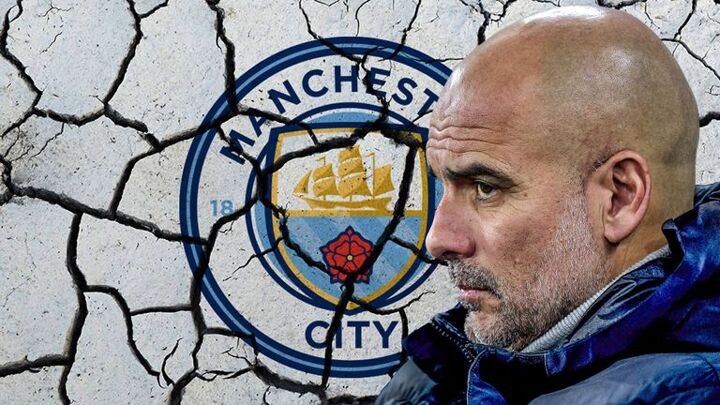Empires fall and the collapse of Manchester City is sudden. Fourteen undefeated. Seven without a win. But while the decline of Pep Guardiola's team has been sharp, it has also been the result of poor planning and a series of disappointing signings.
It already seems clear that Rodri's serious knee injury will come to define City's season and that a player of that caliber – Ballon d'Or winner no less – will always be missed. But there was no need for his absence to completely derail their campaign.
It is a consequence of the squad that has been put together, and Guardiola can lay claim to the need to replace Ilkay Gundogan for three goals against Feyenoord because he is the only midfielder on the books who is available.
That the 34-year-old Gündogan is actually a midfielder is up for debate. A deep-lying playmaker perhaps, but one who was torn between pointing and chasing as James Maddison ran away from his aging legs in that cathartic 4-0 defeat to Tottenham.
Taken in isolation, the decision to bring back such a popular player could be explained away as a no-brainer. And yet it is revealing that this declining strength is needed to fill such a gaping hole in the squad. Rodri has no equal, but was a similar profile really impossible?
Mateo Kovacic, himself 30 and another signing who felt like a short-term solution rather than a rebuild, is also unable to stop the counter-attacks that are crushing City's title hopes. The absence of a defensive midfielder has left them alarmingly vulnerable.
The number of fast breaks leading to a shot on target is higher than ever before during Guardiola's reign. The inability to control these counters undermines their possession game, with passages of play too likely to end in a chance for the opponent.
It's not like the fallout from Rodri's injury should have come as a shock to the club. Four of their five losses last season came in the nine games he missed. And it's not like Rodri is the only player of outsized importance in an unbalanced squad.
The decision to let Julian Alvarez leave for Atletico Madrid this summer leaves them without a clear replacement for Erling Haaland. The Argentinian scored seven goals during the period when Haaland was injured last winter. Who would do that now?
Some of these hiring calls, including the increasingly misjudged sales of Cole Palmer, can be attributed to the demands of profit and sustainability regulations. But there would be sympathy for this argument if the money had not been freely spent in other areas.
City paid £53 million to sign Matheus Nunes from Wolves at the end of last summer, a significant fee for a player who has made just 11 Premier League appearances since then. Even now, Guardiola feels unable to play him in a central role, raising questions about the signing.
Against Liverpool, Nunes was deployed on the left wing – perhaps the only position on the pitch where City look over-stuffed. Jack Grealish, Jeremy Doku and Savinho – three players who consider this perhaps their best position – were among the substitutes.
Grealish, signed for £100m of course, can at least point to the role he played in the club's treble-winning season. But the fact that City have entered the winger market time and again since then suggests he has been little more than a qualified success.
The complaint has long been that Grealish does not contribute enough goals. As of 2024, he has not scored for the club in any competition. But that seems to be a trend among wingers who have built up a stock. Savinho is yet to score a goal in a City shirt.
If this is a stylistic trait, a result of the role imposed on City's wide players, who are required to hug the touchline and stretch the play to create space, it has not stopped Raheem Sterling and Riyad Mahrez when they played there. Then the goals were shared.
Remarkably, Mahrez scored more goals in his final season at City than Grealish has collected in his three-and-a-half years. Two goals between Grealish, Savinho and Doku represent a paltry return this season, further increasing the dependence on Erling Haaland.
The decision to leave Mahrez and Sterling behind suggested at least some willingness to overhaul an aging squad. Doku and Savinho's best years are ahead of them. But how far ahead? It is a problem if others in Stadsblauw are allowed to grow old.
Gundogan's presence in midfield alongside Kevin De Bruyne, 33, and Bernardo Silva, now 30, could explain why speed on the pitch is such an issue now. Kyle Walker, who has always been so reliant on his speed, faces similar challenges on defense. Even John Stones is 30 now.
There's an old saying that the core of a group is ideally in their mid-twenties. There are only three players in City's entire squad between the ages of 25 and 28: Nunes, Rodri and Ruben Dias. They have the oldest average age of any team in the Premier League.
Again, this problem is most pronounced in midfield, a demanding position both physically and tactically. Rico Lewis, only twenty, could develop into a top player, but the question is whether he is there yet. He doesn't deliver the required progressive steps.
Lewis' growth will take time. It cannot be rushed, just as the decline of others cannot be stopped. Guardiola will work to correct and cover up these shortcomings, but they will take time and transfer windows to resolve. Gradually, then suddenly, City's shortcomings have been exposed.
